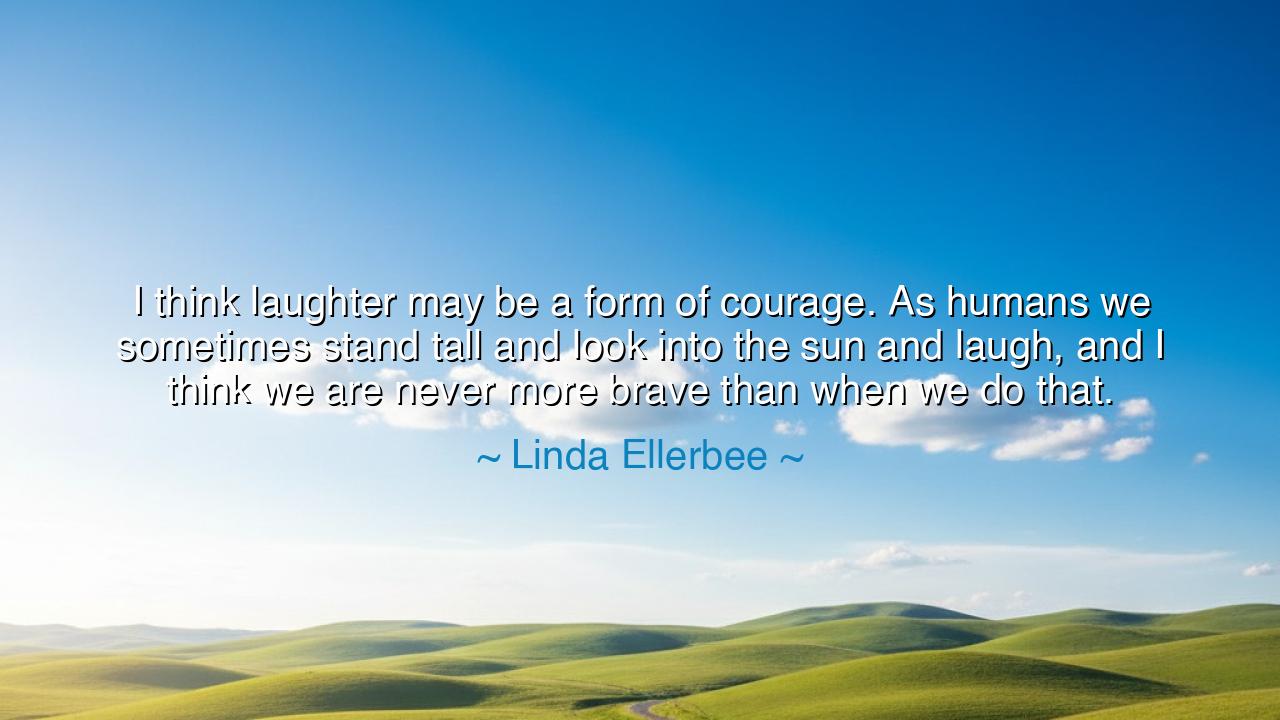
I think laughter may be a form of courage. As humans we sometimes
I think laughter may be a form of courage. As humans we sometimes stand tall and look into the sun and laugh, and I think we are never more brave than when we do that.






Hear now the words of Linda Ellerbee, a woman of voice and vision, who once said: “I think laughter may be a form of courage. As humans we sometimes stand tall and look into the sun and laugh, and I think we are never more brave than when we do that.” Her words rise like a hymn to the indomitable spirit of humankind—a celebration of that strange, shining moment when, though the heart trembles and the storm rages, the soul still finds breath to laugh. In that laughter lies not denial, but defiance; not weakness, but strength; not despair, but a fierce faith in life itself.
For laughter, when born from pain, becomes a shield forged of light. It is the rebellion of the spirit against fear and sorrow. It says to the world, “You may wound me, but you will not own me.” In this way, laughter becomes a quiet act of courage—a way of standing upright in the face of darkness. The one who can laugh when everything falls apart has already won a battle that armies cannot fight. For laughter is not a sound of ignorance—it is a declaration of resilience, the music of the soul that refuses to bow.
Ellerbee, who spent her life amid the storms of journalism and personal struggle, knew this truth well. She faced illness, doubt, and loss, yet she did not drown in sorrow. She learned to stand in the sunlight, even when the shadows stretched long behind her. Her laughter was not careless—it was brave, an affirmation that life, though imperfect, is still precious. To laugh, she taught, is to take back power from pain, to look directly at the trials of existence and say, “You cannot silence me.” It is a form of courage, not because it ignores reality, but because it embraces it with open arms.
History, too, remembers those who laughed in the face of despair. Viktor Frankl, the psychologist and survivor of the Nazi concentration camps, spoke of prisoners who would tell jokes even as death surrounded them. Their laughter was fragile, yes—but it was also heroic. It was the final spark of human dignity refusing to be extinguished. “Everything can be taken from a man but one thing,” Frankl wrote, “the last of human freedoms—to choose one’s attitude in any given set of circumstances.” That choice, sometimes, is laughter. And in that moment, the heart becomes unconquerable.
Think also of Charlie Chaplin, who used humor to confront the cruelties of his time. In The Great Dictator, he made the world laugh at tyranny itself. Through comedy, he stripped evil of its power. His laughter was a form of courage and truth, a mirror held to the madness of the age. When a person laughs in the face of fear, the fear loses its shape. When a people laugh together, oppression begins to crumble. For laughter unites hearts and lightens burdens, reminding us that even in suffering, the flame of humanity burns bright.
But make no mistake—this laughter of which Ellerbee speaks is not shallow mirth or mockery. It is sacred laughter, born from wisdom. It comes not from forgetting pain, but from transcending it. To laugh in times of joy is natural; to laugh in times of despair is divine. Such laughter is the roar of the soul that has discovered meaning beyond misery, beauty beyond brokenness. It is the sunlight within us rising to meet the darkness without.
So let this truth settle in your heart: when life tests you, when grief weighs upon your shoulders, do not let your spirit be silent. Stand tall, as Ellerbee said, and look into the sun. Find a reason, however small, to laugh—at yourself, at the absurdity of fate, at the stubborn miracle of being alive. That laughter will not erase your pain, but it will remind you that you are greater than it. In that instant, you will know courage in its purest form: the courage to live with an open heart in a world that can wound it.
Thus, remember this teaching—laughter is a form of courage. It is the song of the soul that refuses surrender, the light that no darkness can extinguish. Cultivate it in your days. Share it in your sorrows. Let it rise like dawn after a long night. For in every true laugh, there echoes a quiet act of heroism—a declaration that the human spirit, though tested, remains forever unbroken.






AAdministratorAdministrator
Welcome, honored guests. Please leave a comment, we will respond soon